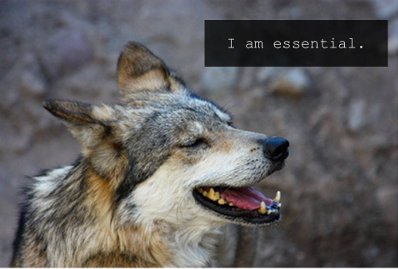Act Now! Endangered Female Mexican Wolf Targeted for Government Trapping
 The Fish and Wildlife Service (USFWS) has ordered that a critically endangered wild Mexican gray wolf be trapped for permanent removal from the wild.
The Fish and Wildlife Service (USFWS) has ordered that a critically endangered wild Mexican gray wolf be trapped for permanent removal from the wild.
At last official count, there were only 75 Mexican gray wolves in the wild, making them the most endangered mammal in north America, and the most endangered wolf in the world. Every single wild Mexican wolf is a loss, yet USFWS continues to treat these wolves as expendable.
Since 1998, the government has removed over 55 wolves from the wild. Most were trapped and 13 were shot by predator-control agents. Federal agencies still don’t require livestock owners using public lands to take basic steps to prevent conflict, such as removing carcasses of dead cattle and other proven successful prevention measures. And it has been over five years since USFWS successfully released a new Mexican wolf into the wild.
In October, Wildlife Services trapped this loba’s mate, the alpha male of the Paradise pack, over livestock losses. She has since paired up with a different mate, a male wolf from the San Mateo Pack, and has not attacked livestock in almost five months! Nonetheless, USFWS is keeping the order to trap her in place.
Please call the USFWS and your members of congress and tell them this wolf deserves to live her life in the wild. Share this message with everyone you know and ask them to do the same.
Here are three key points to make when you call:
1. This female Mexican wolf should be kept in the wild.
Wolves are social animals that rely on family members in hunting and pup rearing. This female wolf has paired up with a new male wolf since her mate was trapped over livestock depredations and has not depredated on livestock since. Removing this wolf will break up a potential new breeding pair and will place her and all of the wolves near her at risk, since capture carries a high risk of accidental death or injury. And it will set us back to the policy of scapegoating wolves who occasionally prey on livestock — even when the stock-owner is reimbursed.
2. The US Fish and Wildlife Service should release many more wolves, not remove them.
At last count, just 75 wolves including three breeding pairs survived in the wild. If the USFWS is truly concerned about the growth of the population and its genetic health, the answer is more releases of captive wolves, not more wild wolves lost to risky trapping operations and permanent captivity. Instead of taking this wolf from her mate, USFWS needs to focus on expediting releases of many more wolves from captivity to strengthen the wild population.
3. Removing or killing critically endangered Mexican gray wolves is not the solution to livestock conflicts.
There are many solutions to conflicts between livestock and wolves, but there are very few Mexican gray wolves. Livestock businesses on public lands are reimbursed for losses and can receive government and non-profit assistance for non-lethal proactive measures to avoid depredation-they have a responsibility to do so. Deterrents to livestock conflicts are the solutions, not removing more endangered Mexican wolves.
If you live in New Mexico, calls to your Senators are the top priority. If you live elsewhere, calls to the US Fish and Wildlife Service are the priority. If you can call your members of Congress and the USFWS, that will help most.
New Mexico Senators
Senator Martin Heinrich DC: 202-224-6621 ABQ: 505-346-6601
Senator Tom Udall DC: 202-224-5521 ABQ: 505-346-6791
USFWS Southwest Regional Office
External Affairs Office: 505-248-6911
Mexican Wolf Recovery Coordinator: 505-761-4748
Main Office: 505-248-6920
USFWS in Washington, DC Public number: 1-800-344-9453
Your Congressional representatives (click here to find numbers)
Your Senators outside of New Mexico (click here to find numbers
Phone calls usually carry more weight than emails, but if you absolutely can’t call, click here for email contacts.
Thank you for all you do for these beautiful, intelligent, highly endangered animals! They would thank you too, if they could.



